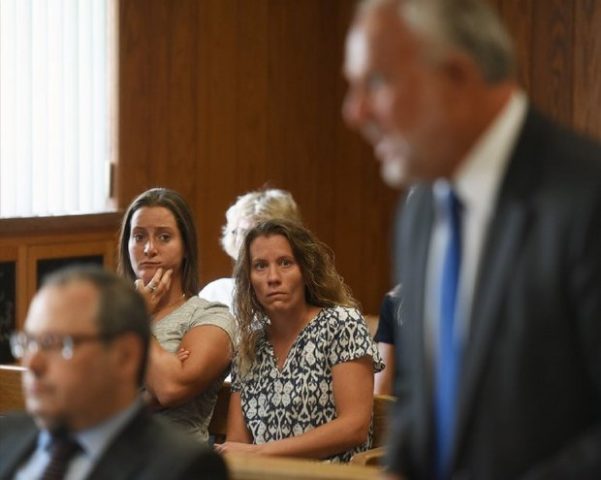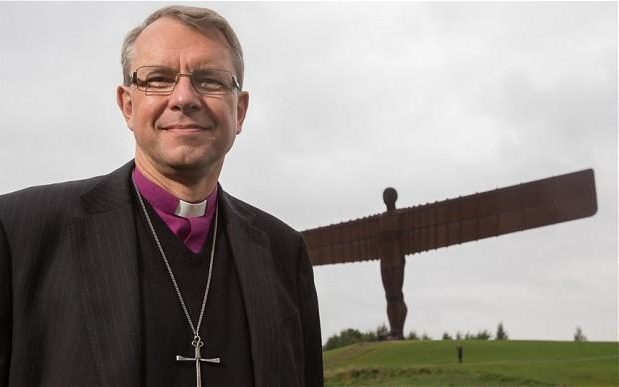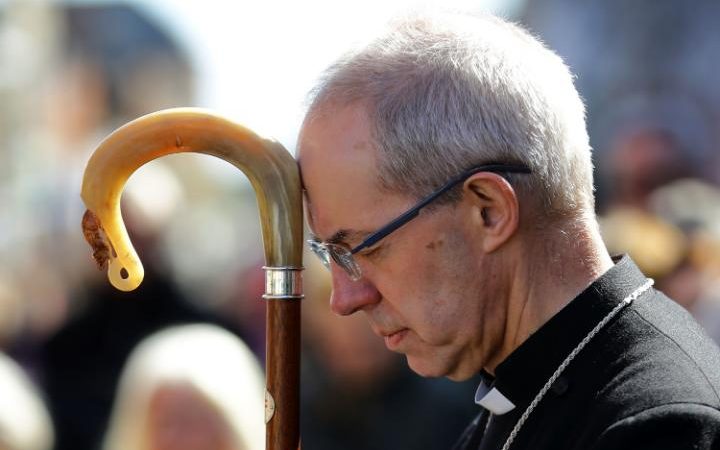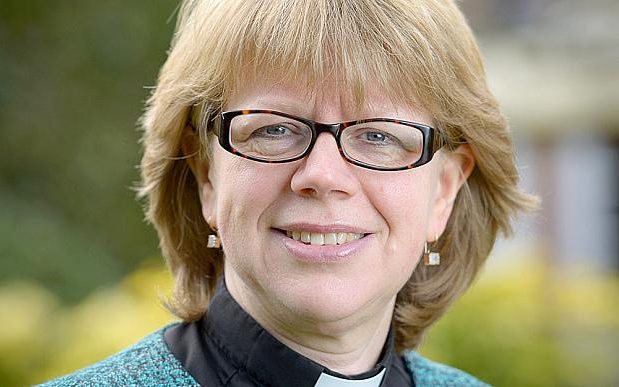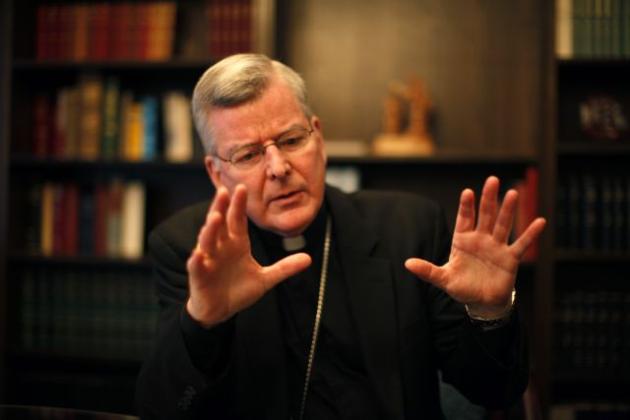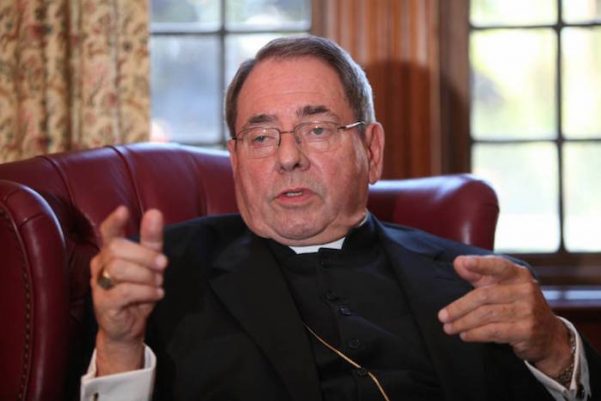
By ALLISON PRIES
The archbishop of Newark, John J. Myers, issued a statement Wednesday standing by Paramus Catholic High School’s decision to fire an employee because she’s in a same-sex marriage, asserting that her lifestyle could “create confusion and uncertainty in the moral formation” of students.
Myers’ statement — which one cleric said reflects the church’s resistance to a changing secular society — went out to all parish and school communities within the four-county archdiocese and was shared with the media by the archdiocese’s public relations office.
A harsher critic, however, said the statement highlights the contrast in Myers’ lenient treatment of priests accused or suspected of sexual abuse, as opposed to employees whom the church discovers to be in same-sex marriages.
The seven paragraph statement was offered as a response to media inquiries about the litigation filed by Kate Drumgoole, 33, of Bogota against Paramus Catholic, school President James P. Vail and the archdiocese. Drumgoole claims she was discriminated against when administrators fired her — not for being gay, but for being in a same-sex marriage.
Drumgoole’s marriage to Jaclyn Vanore, 29, both of whom are Paramus Catholic graduates, was made known to school officials by Vanore’s estranged sister, who posted their wedding pictures to Facebook pages associated with the school and Vail’s personal account. The pictures were never viewed publicly, according to her attorneys.
After meeting with Drumgoole, administrators said she no longer had “plausible deniability” and terminated her as dean of guidance and as head girls’ basketball coach.
Battle lines of church and state: Fired over same-sex marriage, educator sues Paramus Catholic
As part of her employment, Drumgoole was required to sign a contract agreeing to abide by the tenets of the Catholic Church.
“When someone involved in Catholic education ministry offers a public counter-witness to Catholic teaching, he or she does not teach the Truth or further the mission of the Church,” Myers said.
“Such actions can create confusion and uncertainty in the moral formation of the young people he or she encounters,” the archbishop’s statement continued. “When that happens, the Church must be free to take corrective steps to maintain the identity and the integrity of her mission. This right is protected by the United States Constitution as well as federal and state law.”
Christopher Westrick, an attorney for the school, Vail and the archdiocese, tried to have the lawsuit dismissed, arguing that it involved the separation of church and state. In his motion Westrick said that the defendants did not violate New Jersey laws against discrimination because within the law, churches are allowed to require employees to subscribe to their tenets.
He argued the defendants’ conduct is protected under the First Amendment, which guarantees the free exercise of religion and freedom from government interference.
Drumgoole’s attorneys argued that her job did not consist of ministerial duties and that other employees who are divorced, living with people of the opposite sex or have children out of wedlock were not fired. They also said that the school adopts some of the state’s anti-discrimination laws, thereby making it subject to all of them.
Eric Kleiner, Drumgoole’s other attorney called her courageous for fighting “forces that are much more powerful than her.”
“Such heroism will not be muted or diffused or lessened by the extremely harsh and divisive language given by the Archbishop,” he said.
Superior Court Judge Lisa Perez Friscia last week denied the school’s motion to dismiss, allowing the case to move forward to a yearlong discovery phase in which Drumgoole’s attorneys could interview staff and faculty and have access to school documents and policies.
The case drew the attention of hundreds of alumni, parents and former faculty of Paramus Catholic who signed an online petition demanding that Drumgoole be rehired. It also was covered widely in the media.
Myers acknowledged the criticism.
“Much has been said in recent days about respect, diversity and mercy,” Myers said. “I agree that these qualities are important to the mission of the Catholic Church, especially through the ministry of Catholic education. Every person deserves to be treated with dignity, to be given respect, and to be shown the qualities of mercy.”
But, he said, “the invitation to join in the life of the Church does not include an invitation to alter or redefine what the Church believes and teaches, nor is it an invitation to allow others to define the identity, mission and message of the Church.”
“Even Jesus recognized that some people could not or would not accept His teaching,” Myers’ statement continued. “He was saddened when they walked away from Him, but He never altered His teaching. Nor shall we do so today.”
Drumgoole’s attorney, Lawrence Kleiner, said Myers’ statement “is taking an issue that has already divided its members and turning it into a chasm.”
In a 256-page document titled “The Joy of Love,” Pope Francis in April reiterated church teachings that gays should be welcomed with respect and dignity. But he resoundingly rejected same-sex marriage and said that gay unions cannot be equivalent to a marriage between a man and woman.
The positions are the same as those adopted by bishops from around the world who met in Vatican City in October 2015 for a three-week synod.
The Rev. Thomas Reese, a senior analyst at the National Catholic Reporter, a publication owned and largely run by laypeople, said gay marriage is “one of those areas where American culture is changing faster than the Catholic Church.”
Societal opinions about gays and same-sex marriage have changed quickly over the past 30 to 40 years, he said. But the Catholic institutions believe their employees should observe the moral example of the church.
“You’ve got these two things in conflict,” Reese said. “These things are going to be worked out over time. I think the church is going to become more accepting of their employees having these unions. But where the Catholic Church is right now, you’re going to see these things blow up.”
Reese said he believes some institutions look the other way. “It’s when these things become very public that bishops become involved and lawsuits get involved,” he said, adding, “I’m old enough to remember when Catholic teachers got fired when they got divorced. We simply don’t do that anymore.”
Mark Crawford, the state director of the New Jersey Survivors Network of those Abused by Priests, called Myers’ statement “hypocritical.”
“He’ll protect those clergy he knows abused children yet hold these hard-line positions against people who love each other,” Crawford said. “It’s so backward.”
“This is what we’ve come to expect from our archbishop, unfortunately,” he said. “Hopefully, Francis will send a new shepherd our way that is more understanding, compassionate and fair.”
Complete Article HERE!

